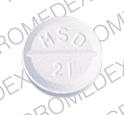Cogentin Dosage
Generic name: Benztropine Mesylate 1mg in 1mL
Dosage form: injection
Drug class: Anticholinergic antiparkinson agents
Medically reviewed by Drugs.com. Last updated on Sep 28, 2023.
Since there is no significant difference in onset of effect after intravenous or intramuscular injection, usually there is no need to use the intravenous route. The drug is quickly effective after either route, with improvement sometimes noticeable a few minutes after injection. In emergency situations, when the condition of the patient is alarming, 1 to 2 mL of the injection normally will provide quick relief. If the parkinsonian effect begins to return, the dose can be repeated.
Because of cumulative action, therapy should be initiated with a low dose which is increased gradually at five or six-day intervals to the smallest amount necessary for optimal relief. Increases should be made in increments of 0.5 mg, to a maximum of 6 mg, or until optimal results are obtained without excessive adverse reactions.
Postencephalitic and Idiopathic Parkinsonism: The following dosing guidelines were written in reference to both benztropine mesylate tablets and COGENTIN Injection. Benztropine mesylate tablets should be used when patients are able to take oral medication. The usual daily dose is 1 to 2 mg, with a range of 0.5 to 6 mg parenterally.
As with any agent used in parkinsonism, dosage must be individualized according to age and weight, and the type of parkinsonism being treated. Generally, older patients, and thin patients cannot tolerate large doses. Most patients with postencephalitic parkinsonism need fairly large doses and tolerate them well. Patients with a poor mental outlook are usually poor candidates for therapy.
In idiopathic parkinsonism, therapy may be initiated with a single daily dose of 0.5 to 1 mg at bedtime. In some patients, this will be adequate; in others 4 to 6 mg a day may be required.
In postencephalitic parkinsonism, therapy may be initiated in most patients with 2 mg a day in one or more doses. In highly sensitive patients, therapy may be initiated with 0.5 mg at bedtime, and increased as necessary.
Some patients experience greatest relief when given the entire dose at bedtime; others react more favorably to divided doses, two to four times a day. Frequently, one dose a day is sufficient, and divided doses may be unnecessary or undesirable.
The long duration of action of this drug makes it particularly suitable for bedtime medication when its effects may last throughout the night, enabling patients to turn in bed during the night more easily, and to rise in the morning.
When COGENTIN is started, do not terminate therapy with other antiparkinsonian agents abruptly. If the other agents are to be reduced or discontinued, it must be done gradually. Many patients obtain greatest relief with combination therapy.
COGENTIN may be used concomitantly with SINEMET (Carbidopa-Levodopalevodopa), or with levodopa, in which case dosage adjustment may be required in order to maintain optimum response.
Drug-Induced Extrapyramidal Disorders: In treating extrapyramidal disorders due to neuroleptic drugs (e.g., phenothiazines), the recommended dosage is 1 to 4 mg once or twice a day parenterally. Dosage must be individualized according to the need of the patient. Some patients require more than recommended; others do not need as much.
In acute dystonic reactions, 1 to 2 mL of the injection usually relieves the condition quickly.
When extrapyramidal disorders develop soon after initiation of treatment with neuroleptic drugs (e.g., phenothiazines), they are likely to be transient. One to 2 mg of COGENTIN two or three times a day usually provides relief within one or two days. If such disorders recur, COGENTIN can be reinstituted. Certain drug-induced extrapyramidal disorders that develop slowly may not respond to COGENTIN.
More about Cogentin (benztropine)
- Check interactions
- Compare alternatives
- Reviews (10)
- Drug images
- Side effects
- During pregnancy
- Drug class: anticholinergic antiparkinson agents
- Breastfeeding
Patient resources
- Cogentin drug information
- Cogentin (Benztropine Injection) (Advanced Reading)
- Cogentin (Benztropine Oral) (Advanced Reading)
Professional resources
Related treatment guides
Further information
Always consult your healthcare provider to ensure the information displayed on this page applies to your personal circumstances.


